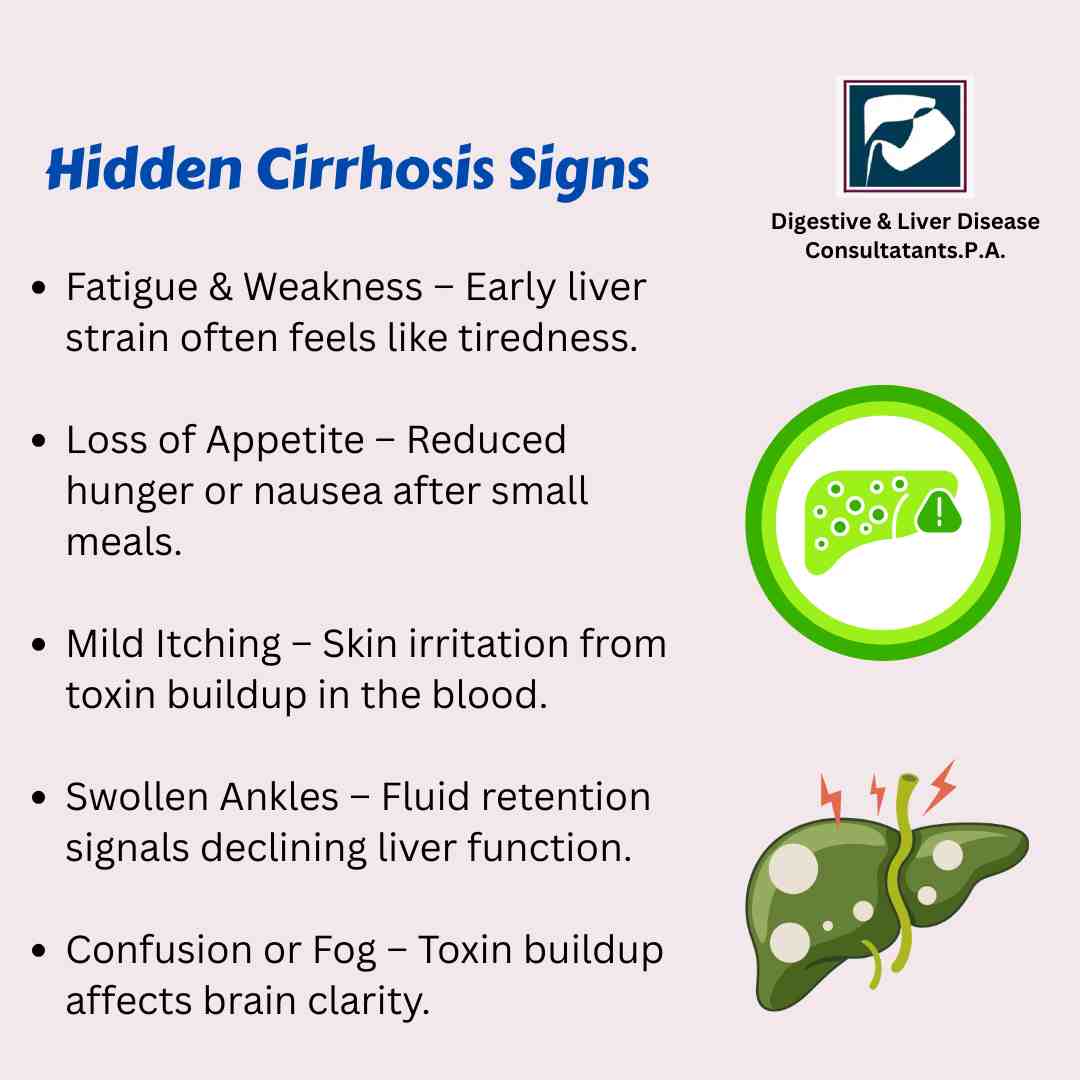Cirrhosis is a serious liver condition that develops slowly over time. It occurs when healthy liver tissue is replaced by scar tissue due to chronic liver damage. This scarring prevents the liver from working properly and can lead to life-threatening complications if not detected early.
The biggest challenge with cirrhosis is that it often develops silently. Many people don’t realize they have it until the disease has reached an advanced stage. Recognizing the early and subtle symptoms can make a big difference in getting timely treatment and preventing further liver damage.
Understanding Cirrhosis
Your liver is one of the most important organs in your body. It filters toxins from the blood, produces bile to digest fats, and stores essential nutrients. When the liver is injured—whether from long-term alcohol use, fatty liver disease, or viral hepatitis—it begins to form scar tissue in an attempt to heal itself.
Over time, as more scar tissue builds up, blood flow through the liver becomes restricted. This scarring process is called cirrhosis. Once cirrhosis develops, it can’t be completely reversed, but early detection and treatment can slow or stop its progression.

Early Symptoms of Cirrhosis People Often Overlook
1. Fatigue and Weakness
Feeling constantly tired or weak is one of the earliest signs of liver disease. The liver plays a major role in energy metabolism, and when it’s not functioning properly, your body can feel drained—even with adequate rest.
2. Loss of Appetite and Unexplained Weight Loss
Many people with cirrhosis notice a reduced desire to eat or feel full quickly after eating. This can lead to gradual weight loss or malnutrition. Because these symptoms develop slowly, they are often mistaken for stress or aging.
3. Nausea and Digestive Issues
Cirrhosis can affect the way your body digests food. Some people may experience nausea, bloating, or discomfort after meals. This happens because the liver’s ability to produce bile—a substance that helps digest fats—is reduced.
4. Itchy Skin (Pruritus)
Persistent itching, especially without a rash, is an overlooked symptom of liver disease. As bile salts build up under the skin, they cause irritation and itching. Many people treat it as a skin problem without realizing it may be linked to liver dysfunction.
5. Easy Bruising or Bleeding
The liver produces proteins that help your blood clot. When it becomes damaged, you may bruise or bleed more easily than usual, even from small cuts or bumps.
6. Swelling in Legs or Abdomen
Fluid retention is a common sign of cirrhosis. It may appear as swelling in the legs (edema) or abdominal area (ascites). People often mistake these symptoms for weight gain or bloating, delaying medical evaluation.
7. Yellowing of Skin and Eyes (Jaundice)
Jaundice occurs when the liver can’t process bilirubin, a yellow pigment produced during the breakdown of red blood cells. While this is one of the more recognizable signs, it often appears in later stages, which is why earlier symptoms should not be ignored.
8. Red Palms or Spider Veins on the Skin
Small, web-like blood vessels on the chest, face, or shoulders, as well as redness on the palms, can be early visual indicators of liver damage. These changes happen because the liver can’t regulate hormones properly.
9. Mental Confusion or Difficulty Concentrating
A buildup of toxins in the bloodstream can affect brain function, a condition known as hepatic encephalopathy. People may experience memory problems, confusion, or changes in sleep patterns. These symptoms are often attributed to stress, but they may signal liver dysfunction.
10. Dark Urine and Pale Stools
Changes in urine or stool color can reflect how well the liver and bile ducts are working. Dark urine and light or gray stools may mean bile flow is blocked, a possible sign of cirrhosis or another liver condition.
When to See a Doctor
If you notice persistent fatigue, swelling, yellowing of the eyes, or other unexplained changes, it’s important to consult a gastroenterologist or hepatologist. Early diagnosis can help manage symptoms, prevent further damage, and improve quality of life.
At Digestive & Liver Disease Consultants, P.A., we emphasize early detection through comprehensive liver function testing, imaging, and personalized treatment plans.
How Cirrhosis Is Diagnosed
Doctors use several methods to confirm cirrhosis and evaluate its severity, including:
Blood tests: To check liver enzymes, bilirubin, and clotting function
Imaging studies: Ultrasound, CT, or MRI scans to assess liver size and texture
FibroScan: A noninvasive test to measure liver stiffness
Liver biopsy: In some cases, a small tissue sample may be taken for analysis
These tests help determine how advanced the disease is and guide the best course of treatment.
Managing and Slowing the Progression of Cirrhosis
While cirrhosis cannot always be reversed, proper management can prevent further damage. Treatment depends on the cause but may include:
Lifestyle changes: Avoid alcohol, maintain a balanced diet, and stay physically active
Medications: To manage symptoms, reduce inflammation, and prevent complications
Nutritional support: A diet rich in protein and low in sodium helps maintain strength and prevent fluid buildup
Regular monitoring: Routine checkups ensure any new symptoms or complications are caught early
For advanced cases, liver transplantation may be considered.
About Digestive & Liver Disease Consultants, P.A.
At Digestive & Liver Disease Consultants, P.A., our team of board-certified gastroenterologists provides expert care for patients with liver and digestive disorders. We specialize in diagnosing and managing cirrhosis, fatty liver disease, hepatitis, and other complex liver conditions.
Our clinic combines advanced diagnostic technology with compassionate, personalized care. From early detection to long-term management, our goal is to help patients live healthier, more comfortable lives.
Conclusion
Cirrhosis develops gradually and often goes unnoticed until serious damage has occurred. Recognizing early symptoms such as fatigue, loss of appetite, itching, or abdominal swelling can lead to timely diagnosis and better outcomes. Regular liver checkups and healthy lifestyle choices are key to preventing progression.
If you’re experiencing symptoms like fatigue, swelling, or unexplained weight changes, don’t ignore them. Schedule an appointment with Digestive & Liver Disease Consultants, P.A. today. Our best gastroenterologists can evaluate your liver health, identify underlying issues, and provide the care you need to protect your liver and overall well-being.






